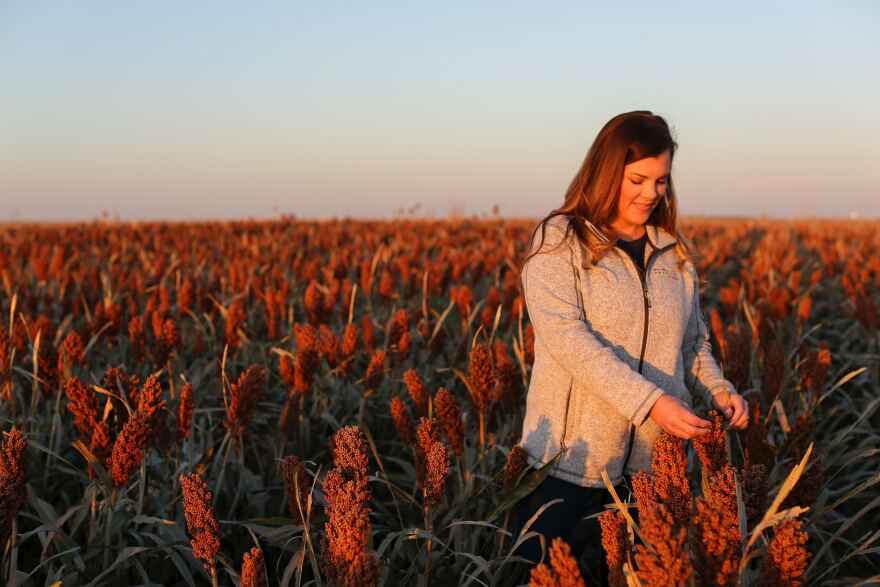Story by Calen Moore
Harvest season for sorghum has wrapped up in Kansas, but 10,000 miles away in Madagascar the planting season has only just begun.
Those farmers in the African country could soon be using western Kansas strategies for growing the grain as they grapple with a changing climate.
A $2.5 million grant will fund the international partnership at a time when farmers in both Kansas and Madagascar are working to cope with water scarcity. Portions of Kansas are facing record drought and groundwater depletion while climate change is shortening the critical rainy seasons in Madagascar.
The new grant from the United States Agency for International Development will help Kansas State University share research on different varieties of sorghum that can better tolerate a changing climate.
Sorghum is a grain that is native to Africa, but farmers in places like Kansas have adopted it because of its resistance to drought.
Boyd Funk has farmed mostly sorghum north of Garden City for 45 years.
“Sorghum came from Africa, and has been so helpful as this area becomes more dryland,” Funk said.
Madagascar farmers historically grew sorghum, but that’s been declining since the 1990s in favor of more marketable crops such as corn. But just like in Kansas, corn has become less reliable in recent years. This has led to food insecurity, especially in southern Madagascar.
Timothy Dalton, director of the Sorghum and Millet Innovation Lab at K-State, said this is the latest in a history of international partnerships focused on sharing crop research.
“That's how the Madagascar embassy invited us. They knew of what we had been doing in other countries, looking at opportunities to improve productivity,” Dalton said.
Those strategies include “seedball technology,” a method of seed priming that mixes seeds, wood, soil, ash and additives to create a micronutrient dense ball that produces higher yields in the driest of regions.
More than 50% of sorghum in the world is produced to feed humans, but the crop in higher income countries is usually used to feed animals.
Collaborative Research on Sorghum and Millet has provided other countries with sorghum varieties that fight off common diseases well on their own. They’re a good option for farmers who do not have access to fungicides.
Dalton said the benefits of international collaborations go both ways. Kansas provides plant breeding and genetic research, and other countries provide a look into developing farming practices in a shifting climate plus what to expect in the future.
The international partnerships also help Kansas through shared research on potential threats to crops. In 2013, sugarcane aphids developed on sorghum plants in Texas. That year farmers lost half of their yield from pests. But help from African farmers gave Kansas a head start by identifying varieties from Ethiopia that had resistance to the aphids.
“By the time it got to Kansas, we had already been studying and working on this problem from our collaborations in southern Africa,” Dalton said.
Western Kansas has a climate that parallels the climate of many arid countries. Some towns in the area, like Garden City and Scott City experienced their driest year on record last year. The region is also faced with the challenge of conserving the groundwater used for irrigation from the Ogallala aquifer.
Similar to other countries experiencing climate change, Kansas has recently seen itself go through an agricultural identity crisis.
The excessive heat and water insecurity has made crops like corn and wheat less productive, falling behind states like Iowa and North Dakota. Kansas plants the most wheat in the country, but is also the nation’s top sorghum producer.
Last year, Kansas produced about 105 million bushels of sorghum, twice as much as Texas, the second largest sorghum producer. The plant’s long-term popularity has been bolstered by drought, crop research and a pivot to water conservation.
Amy France is the vice chairman for the National Sorghum Producers in Scott City. She has witnessed the evolution of sorghum in western Kansas and how it helps in crop rotation, like wheat and other grains by holding moisture and nutrients in the soil.
“Other crops need everything to be the perfect conditions,” she said. “But that’s what I like about sorghum, it doesn’t need perfect. It makes do and even helps the next crop you’re planting.”
While crops like sorghum and millet have been prominent in Kansas, they’re still smaller in popularity compared to corn and wheat. The state has 3.3 million acres dedicated to sorghum, compared to 5.5 million acres for corn and 7 million for wheat. Last year, Kansas farmers harvested 5.5 million bushels of corn and 220 million bushels of wheat.
Now more people are paying attention to sorghum farmers in Kansas lead the way with research and production of this African grain, to the point of even sharing new research with farmers in the crop’s native range.
“It's exciting to see the opportunities that have come up, and the wealth of knowledge shared with others,” France said.
Calen Moore covers western Kansas for High Plains Public Radio and the Kansas News Service. You can email him at cmoore@hppr.org.
The Kansas News Service is a collaboration of KCUR, Kansas Public Radio, KMUW and High Plains Public Radio focused on health, the social determinants of health and their connection to public policy.
Kansas News Service stories and photos may be republished by news media at no cost with proper attribution and a link to ksnewsservice.org.

